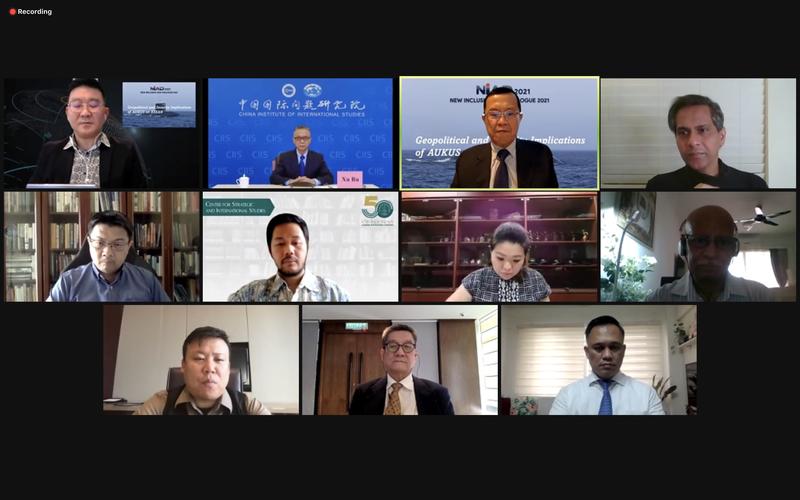 International experts discuss geopolitical and security implications of AUKUS on ASEAN at the New Inclusive Asia Dialogue on Oct 26, 2021. (SCREENSHOT VIA ZOOM)
International experts discuss geopolitical and security implications of AUKUS on ASEAN at the New Inclusive Asia Dialogue on Oct 26, 2021. (SCREENSHOT VIA ZOOM)
HONG KONG – The trilateral security partnership AUKUS will undermine regional peace and stability and create uncertainty in Southeast Asia, experts said in an online seminar on Tuesday.
AUKUS, the military pact comprising the United States, the United Kingdom and Australia, was announced on Sept 15 with the delivery of a nuclear-powered submarine fleet to Australia as its first major initiative.
"Although we all know the purpose of AUKUS is aimed at…containing China or to block Chinese development, or to separate China from other ASEAN countries. It is the countries in the region who are going to suffer," said Xu Bu, president of the China Institute of International Studies.
Xu made the remarks at the New Inclusive Asia Dialogue 2021, organized by Kuala Lumpur-based think tank Centre for New Inclusive Asia. The online seminar brought together experts from across the region and beyond to take part in discussions centered on the theme "Geopolitical and Security Implications of AUKUS on ASEAN".
Noting regional countries have been trying to stay neutral and avoid being aligned with any great power for the sake of peace, stability and development, Xu, a former Chinese ambassador to the 10-member Association of Southeast Asian Nations, said the move to transfer nuclear technology to Australia will lead to an arms race in the region.
READ MORE: AUKUS spurs arms race, puts to test Aussie non-proliferation pledge
The trilateral security partnership, he said, will escalate tensions in the region.
Ong Tee Keat, chairman of the Centre for New Inclusive Asia, said AUKUS will inevitably turn the near sea of the ASEAN region, especially the South China Sea, into a conflict-prone zone.
At the end of the day, what AUKUS is about is the macro geopolitical contestation to the extent that it fouls up ASEAN's relations with China in its neighborhood. That is a concern for ASEAN.
Sourabh Gupta, Resident senior fellow, Institute for China-America Studies, Washington, D.C.
"The (South China Sea) issue could be amicably (discussed) between China and the ASEAN member states through diplomatic means," said Ong, adding that the three-decade-long dialogue partner relations between the two sides have built maturity, confidence and mutual trust in resolving matters without recourse to external intervention.
Noting AUKUS is specifically aimed to challenge China's maritime activities in the South China Sea, Rommel Banlaoi, chairman of the Philippine Institute for Peace, Violence and Terrorism Research, said it can disrupt existing China-ASEAN maritime cooperation which aims to promote good ocean governance.
Banlaoi said the idea of ocean governance in the South China Sea led by China and ASEAN has strictly conformed to international standards through responsible, accountable and transparent use of maritime resources in a manner that ensures ecological balance while achieving economic prosperity, both at the national and regional level.
Sourabh Gupta, resident senior fellow at the Institute for China-America Studies in Washington D.C., said ASEAN countries prefer to engage China in economics and development, rather than arms-racing, and that the ten-nation bloc needs to have a common position towards AUKUS, especially when it is related to near-sea issues.
"At the end of the day, what AUKUS is about is the macro geopolitical contestation to the extent that it fouls up ASEAN's relations with China in its neighborhood," said Gupta. "That is a concern for ASEAN."
Noting the nuclear submarine cooperation under AUKUS involves transferring weapons-grade uranium of over 90 percent fissile purity to Australia, Surasit Thanadtang, director of the Thai-Chinese Strategic Research Center at the National Research Council of Thailand, said the security pact exposed the double standards of the US and UK on nuclear non-proliferation.
"This decision will (pose a) risk of proliferation of nuclear material and technology and will have an impact on the global nuclear non-proliferation regime," said Surasit.
The Treaty on the Non-Proliferation of Nuclear Weapons, which came into force in 1970, is an international accord that aims to prevent the spread of nuclear weapons and weapons technology. A total of 191 states have joined the treaty.
"Rather than having nuclear-powered submarines, why not (conduct) marine research for humanitarian and disaster relief in the region?" Surasit said, noting issues like counterterrorism, transnational crime in the sea and green development are among the most urgent needs in Asia Pacific.
ALSO READ: Indonesia, Malaysia concerned over AUKUS nuclear subs plan
Ma Bo, research fellow at the Collaborative Innovation Center of South China Sea Studies at the Nanjing University in China, said AUKUS has further marginalized ASEAN centrality as it has forced ASEAN countries to abandon its hedging strategy and to pick sides between China and the US.
"The Indo-Pacific strategy aims to contain the rise of China in the region" as well as "exclude China" from the region, Ma said. But this has ultimately "harmed ASEAN centrality that aims at hedging between the great powers".
Kuik Cheng-Chwee, head of the Centre for Asian Studies at the National University of Malaysia's Institute of Malaysian and International Studies, said Southeast Asia's actions regarding AUKUS will depend on how the China-US relationship as well as US politics and policy evolve.
"If the US, for example, makes it clear that the policy is really about containment, I do not think there will be any takers from Southeast Asia," said Kuik.
Contact the writers at kelly@chinadailyapac.com


